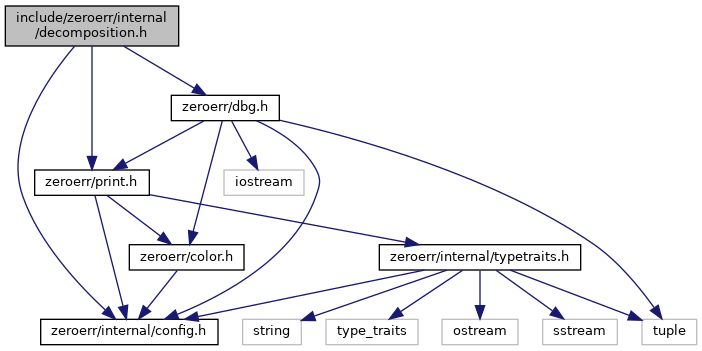Loading...
Searching...
No Matches
decomposition.h File Reference
Include dependency graph for decomposition.h:

This graph shows which files directly or indirectly include this file:

Go to the source code of this file.
Classes | |
| struct | zeroerr::deferred_false< T > |
| struct | zeroerr::ExprResult |
| struct | zeroerr::Expression< L > |
| struct | zeroerr::ExpressionDecomposer |
| class | zeroerr::IMatcher< T > |
| class | zeroerr::IMatcherRef< T > |
| class | zeroerr::CombinedMatcher< T > |
| class | zeroerr::NotMatcher< T > |
| struct | zeroerr::StartWithMatcher< T > |
Namespaces | |
| namespace | zeroerr |
| namespace | zeroerr::details |
Macros | |
| #define | AND &&zeroerr::ExpressionDecomposer() << |
| #define | OR || zeroerr::ExpressionDecomposer() << |
| #define | ZEROERR_SFINAE_OP(ret, op) typename std::decay<decltype(std::declval<L>() op std::declval<R>(), std::declval<ret>())>::type |
| #define | ZEROERR_EXPRESSION_COMPARISON(op, op_name) |
| #define | ZEROERR_EXPRESSION_ANDOR(op, op_name) |
| #define | ZEROERR_FORBIT_EXPRESSION(rt, op) |
Functions | |
| template<typename T > | |
| std::enable_if< std::is_convertible< T, bool >::value, bool >::type | zeroerr::details::getBool (T &&lhs) |
| template<typename T > | |
| std::enable_if<!std::is_convertible< T, bool >::value, bool >::type | zeroerr::details::getBool (T &&) |
| template<typename T > | |
| std::enable_if< std::is_constructible< std::string, T >::value, IMatcherRef< std::string > >::type | zeroerr::start_with (T &&s) |
Macro Definition Documentation
◆ AND
| #define AND &&zeroerr::ExpressionDecomposer() << |
AND and OR are used to combine expressions in a more readable way. For example: CHECK(1 == 1 AND 2 == 2);
In its implementation, the expression is decomposed to ExpressionDecomposer() << 1 == 1 && ExpressionDecomposer() << 2 == 2
◆ OR
| #define OR || zeroerr::ExpressionDecomposer() << |
◆ ZEROERR_EXPRESSION_ANDOR
| #define ZEROERR_EXPRESSION_ANDOR | ( | op, | |
| op_name | |||
| ) |
Value:
ExprResult operator op(ExprResult rhs) { \
std::stringstream ss; \
ss << decomp << " " #op " " << rhs.decomp; \
return ExprResult(res op rhs.res, ss.str()); \
}
◆ ZEROERR_EXPRESSION_COMPARISON
| #define ZEROERR_EXPRESSION_COMPARISON | ( | op, | |
| op_name | |||
| ) |
◆ ZEROERR_FORBIT_EXPRESSION
| #define ZEROERR_FORBIT_EXPRESSION | ( | rt, | |
| op | |||
| ) |
Value:
template <typename R> \
rt& operator op(const R&) { \
static_assert(deferred_false<R>::value, \
"Please Rewrite Expression As Binary Comparison!"); \
return *this; \
}
◆ ZEROERR_SFINAE_OP
| #define ZEROERR_SFINAE_OP | ( | ret, | |
| op | |||
| ) | typename std::decay<decltype(std::declval<L>() op std::declval<R>(), std::declval<ret>())>::type |